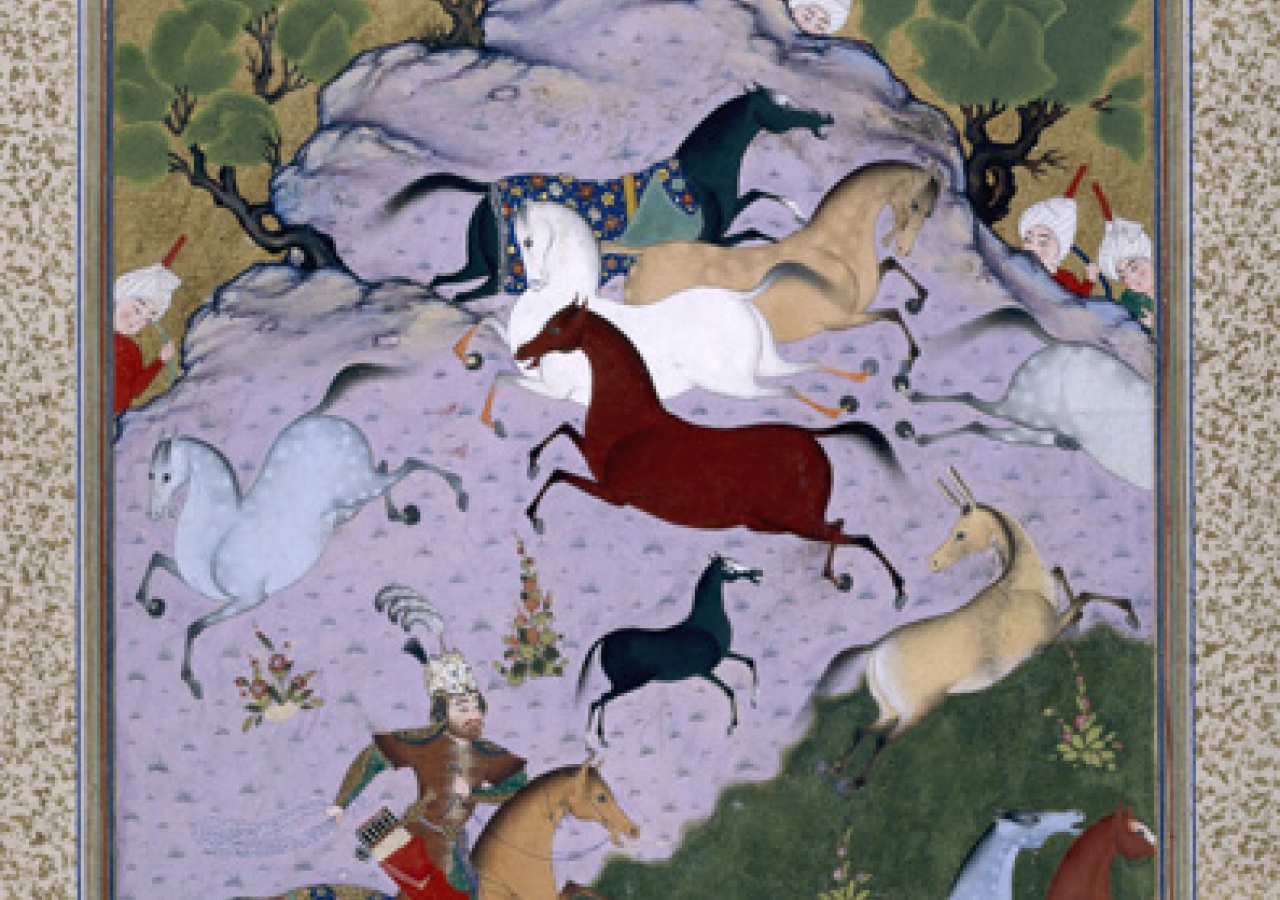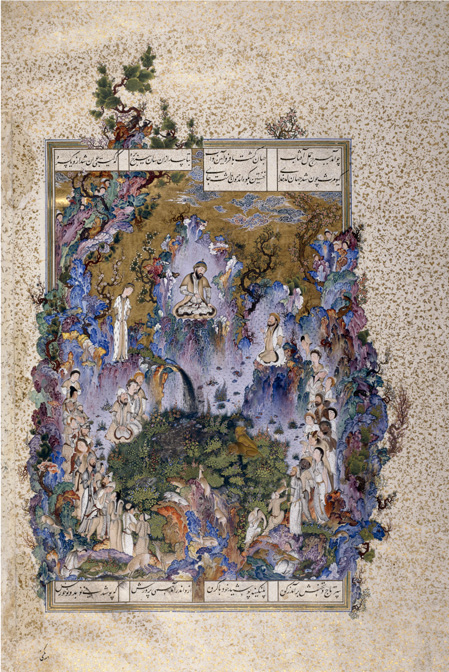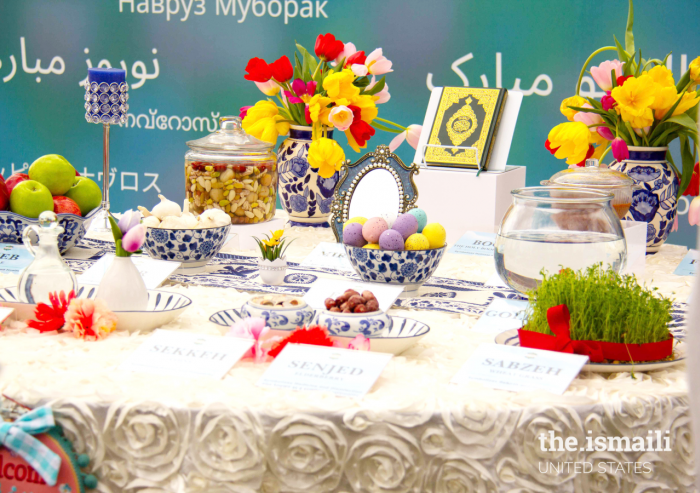The homes that are the dwellings of today
Will sink beneath shower and sunshine to decay
But storm and rain shall never mar
What I have built – the palace of my poetry.
– Firdawsi
 A scene from the Shahnama: Rustam pursues Akvan the Onager-Div. Courtesy of Aga Khan Trust for Culture
A scene from the Shahnama: Rustam pursues Akvan the Onager-Div. Courtesy of Aga Khan Trust for CultureMore than a thousand years ago, a Persian poet by the name of Abu´l-Qasim Firdawsi (d. 1020-21) penned this verse. His prophecy has held true, as the year 2010 marks the 1 000th anniversary of the completion of his historical work, Shahnama, The Book of Kings.
Consisting of some 60 000 verses, it is considered one of the longest and most important epic poems ever written. Firdawsi has been compared to the legendary ancient Greek poet Homer, as he poetically recounts the history of Iranian kings from the beginning of time until the fall of the Sasanian Dynasty in the mid-seventh century.
To commemorate the anniversary of the Shahnama, a richly illustrated lecture by Dr Francesca Leoni, Assistant Curator of the Arts of the Islamic World at the Museum of Fine Arts, Houston, was held on 21 February. The event, which took place at the Museum, was co-sponsored by the Ismaili Council for the Southwestern United States.
“The epic of the Shahnama is a unique mixture of ancient Iranian legends and history, which was passed on orally for many centuries,” explained Dr Leoni. “Through time, a good portion of this material was organised in written collections, though none of these written collections have survived,” she added.
Towards the end of the 10th century, Firdawsi started to capture these stories and diligently worked on them for 35 years. “Firdawsi's Shahnama is the last and most successful example of established literary transmission of Iran's past and cultural ideals,” said Dr Leoni.
Persian reawakening
The Shahnama is organised according to the kingdoms of 50 rulers, and divided into three dynasties: Pishdadiyan, Kayanid, and Sasanian. Prior to the Sasanian era, Iran was called Persia.
As Islam spread, the Iranian lands witnessed an enriching interface with Islam's spirituality, an experience that repeated itself in other lands where Islam spread.
The significance of the Shahnama on reviving Iran's ancient history, literature, and language is indisputable. It was written entirely in Persian. The book reawakened Iran's cultural identity and exemplified the continued resilience of the language's capacity to enrich itself through cultural encounters. The poem helped preserve Iran's pre-Arab traditions, folklore, and oral literature – becoming the Persian literary standard – and it retains considerable influence in the storytelling tradition of Iran, even today. “For 30 years, I suffered much pain and strife…with Persian I gave the ajam verve and life,” Firdawsi had once said.
The Shahnama was also a vessel for the preservation of Persian values and cultural traditions. “The teachings and moral examples offered by the virtuous characters of Shahnama are among the aspects that explain its great success throughout history,” said Dr Leoni. The poem offers models of conduct and governance that inspired generations of rulers. It can also be considered a successful example of a “mirror for princes,” a popular genre in the medieval and early modern Islamic world intended for the education of rulers.
 President of the Council for the Southwestern United States, Aftab Ghesani, speaks with Dr Leoni and others at the reception after the lecture at Museum of Fine Arts, Houston. Shiraz Meharali
President of the Council for the Southwestern United States, Aftab Ghesani, speaks with Dr Leoni and others at the reception after the lecture at Museum of Fine Arts, Houston. Shiraz MeharaliThroughout the poem, kings and heroes are engaged in battles with monsters and supernatural creatures that threaten the survival of their kingdom. Romantic accounts of the Shahnama's heroes add humour and a light-hearted tone. More importantly, the poem illustrates many profound human experiences that allow individuals to connect with the moral struggles of its heroes and reflect upon the tragic deaths of its protagonists.
Artistic inspiration
The Shahnama has also been an important source of influence on many works of art produced in greater Iran, as well as the eastern Islamic world. Specific stories and characters were used as motifs to decorate ceramics, tile panels, inlaid metalwork, lacquer work, and textiles. Many rulers patronised lavishly illustrated copies of the Shahnama, and today their pages can be found in museums and private art collections around the world.
The Aga Khan Museum collection includes pages from a copy made for Shah Tahmasp (1524-1576), an influential ruler of Iran. This particular edition contains some of the most exquisite miniatures ever created, and is considered to be one of the highest achievements in the arts of the book for its superb calligraphy, painting, and illumination. The collection has been touring European museums, and select pieces are currently being exhibited at the Martin-Gropius Bau in Berlin until 6 June 2010. Within the exhibition, a special section pays homage to Firdawsi to commemorate the anniversary.
“Shahnama was a way to immortalise the memory of the poet in the heart of its readers,” said Dr Leoni, “something that its success through the centuries in fact confirms.”
I've reached the end of this great history
And all the land will talk of me
I shall not die, these seeds I've sown will save
My name and reputation from the grave,
And men of sense and wisdom will proclaim,
When I have gone, my praises and my fame.– Extracted from Shahnameh: The Persian Book of Kings, translated by Dick Davis
Suhrab and Rustam
In the epic tale, Suhrab is the son of Rustam, the preeminent protagonist of the Shahnama, whom Dr Leoni jokingly described as “a busy hero.” Father and son have never met, and Suhrab is in perpetual search of his father, whom he knows to be Rustam, but whose face he does not know. When they finally do meet, it is on the battlefield – neither aware of the other's identity, and Rustam mortally wounds Suhrab.
The verses below pour forth from Suhrab as he realises his impending death. By these words he reveals himself to his father, who becomes consumed in agony and anguish:
I brought this on myself, this is from me,
And Fate has merely handed you the key
To my brief life: not you but heaven's vault –
Which raised me and then killed me – is at fault.
Love for my father led me here to die.
My mother gave me signs to know him by,
And you could be a fish within the sea,
Or pitch black, lost in night's obscurity,
Or be a star in heaven's endless space,
Or vanish from the earth and leave no trace,
But still my father, when he knows I'm dead,
Will bring down condign vengeance on your head.
One from this noble land will take this sign
To Rustam's hands, and tell him it was mine,
And say I sought him always, far and wide,
And that at last, in seeking him, I died.– From The Tale of Sohrab in Shahnameh: The Persian Book of Kings, translated by Dick Davis.











